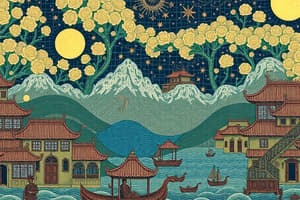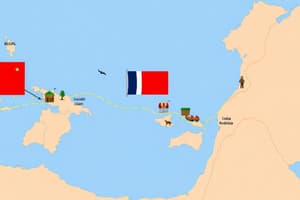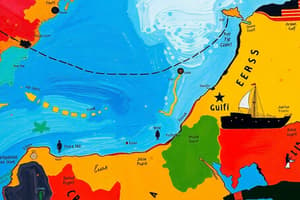Podcast
Questions and Answers
What does the term 'Portuguese Empire' refer to?
What does the term 'Portuguese Empire' refer to?
- How the Portuguese controlled commerce in the Indian Ocean (correct)
- The Portuguese colonies in Africa
- The military forces of the Portuguese
- Portuguese influence in South America
What is a Trading Post Empire?
What is a Trading Post Empire?
A type of empire established by the Portuguese to control commerce without large territorial control.
Who was Ferdinand Magellan?
Who was Ferdinand Magellan?
A Portuguese explorer who sailed for Spain and discovered the Philippine Islands.
The Spanish Empire was only interested in trade.
The Spanish Empire was only interested in trade.
What characterized the Spanish control over the Philippines?
What characterized the Spanish control over the Philippines?
What role did the British East India Company have?
What role did the British East India Company have?
What was the Dutch East India Company known for?
What was the Dutch East India Company known for?
What were Daimyos?
What were Daimyos?
What was the significance of Samurai?
What was the significance of Samurai?
Who was the Shogun?
Who was the Shogun?
What did the Tokugawa Shogunate believe in?
What did the Tokugawa Shogunate believe in?
What was the Silver trade?
What was the Silver trade?
Why was the Fur trade significant?
Why was the Fur trade significant?
What role did Siberia play in the fur trade?
What role did Siberia play in the fur trade?
What was the Atlantic Slave Trade?
What was the Atlantic Slave Trade?
What was the Middle Passage?
What was the Middle Passage?
What does African Diaspora refer to?
What does African Diaspora refer to?
What was the Trans-Saharan slave trade?
What was the Trans-Saharan slave trade?
What is the Sugar trade?
What is the Sugar trade?
What was the Kingdom of Dahomey known for?
What was the Kingdom of Dahomey known for?
Flashcards are hidden until you start studying
Study Notes
Portuguese Empire
- Controlled commerce in the Indian Ocean during the early 16th century.
- Built fortified bases at key trade locations using superior military ships.
Trading Post Empire
- Established by the Portuguese in the Indian Ocean, focusing on controlling commerce rather than large land areas.
Ferdinand Magellan
- Portuguese explorer sailing for Spain who discovered the Philippine Islands.
- The islands attracted Spanish interest due to proximity to China and the Spice Islands.
Spanish Empire
- Sought to control land, people, and resources through colonies, unlike the Portuguese focus on trade.
- Spanish colonies facilitated missionary operations.
Spanish Philippines
- Acquired with minimal violence due to weak local societies and lack of competing powers.
- Became a colony until U.S. control post-Spanish-American War.
British East India Company
- Received a charter from the English government granting trade monopoly and military governance rights.
- Helped surpass Portuguese dominance in the Indian Ocean through military strength.
Dutch East India Company
- Similar to the British, it was granted a charter by the Dutch government for trade monopoly and military rights.
- Used force to monopolize spice trade and settled Dutch populations on seized islands.
Daimyo
- Feudal lords in Japan with their own samurai warriors.
- European military technology appealed to these leaders.
Samurai
- Loyal warriors serving feudal lords in Japan, integral to maintaining conflict and social order.
Shogun
- Supreme military leader who unified Japan politically, concerned about detrimental European influence.
Tokugawa Shogunate
- A ruling clan prioritizing Japan's isolation from European influence while maintaining trade with China and Korea.
Silver Trade
- Rich silver discoveries in Bolivia and Japan increased European wealth, particularly for Spain, which produced 85% of global silver.
- Established early trade links between Asia and the Americas, with significant flows to China.
Fur Trade
- High demand in Europe during the Little Ice Age raised fur value, leading Europeans to exploit American fur sources.
- Resulted in near extinction of beaver populations due to intense demand.
Siberia
- Central to Russia's fur trade expansion due to its rich fur resources.
- Russian control over Siberia involved tribute collection from locals, often using hostages.
Atlantic Slave Trade
- Transport of Africans to Americas and Europe, forever altering participant societies.
- Integral part of the transatlantic economy.
Middle Passage
- Route taken to transport enslaved Africans to the Americas, with a mortality rate of about 14% during the journey.
African Diaspora
- Result of the slave trade, leading to a widespread dispersion of Africans across the Atlantic, significantly influencing the cultures of enslaving nations.
Trans-Saharan Slave Trade
- Network transporting African captives to Mediterranean regions, mainly within the Muslim world.
Sugar Trade
- Driven by high European demand for sugar and reliance on enslaved labor, resulting in sophisticated plantation systems in the West Indies.
Dahomey
- Kingdom in West Africa that rigorously controlled its participation in the slave trade.
- Engaged in extensive trade networks, acquiring goods from around the globe.
Studying That Suits You
Use AI to generate personalized quizzes and flashcards to suit your learning preferences.




